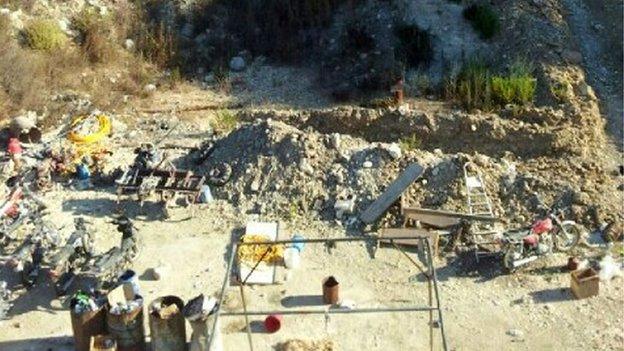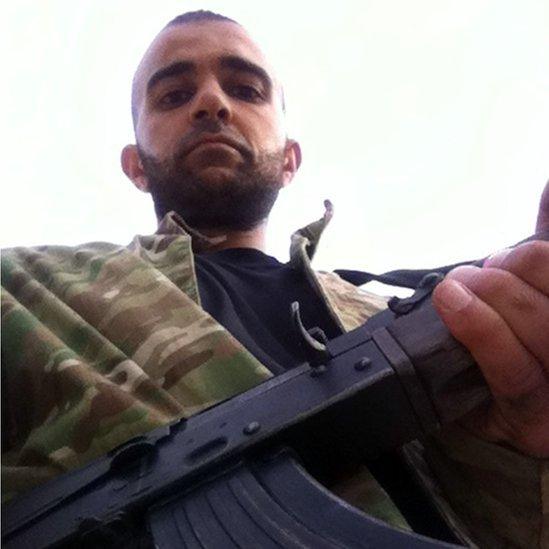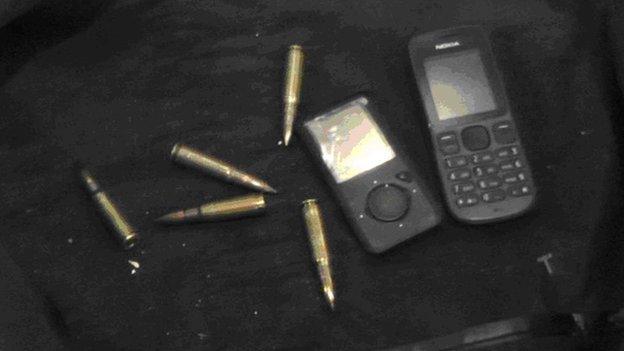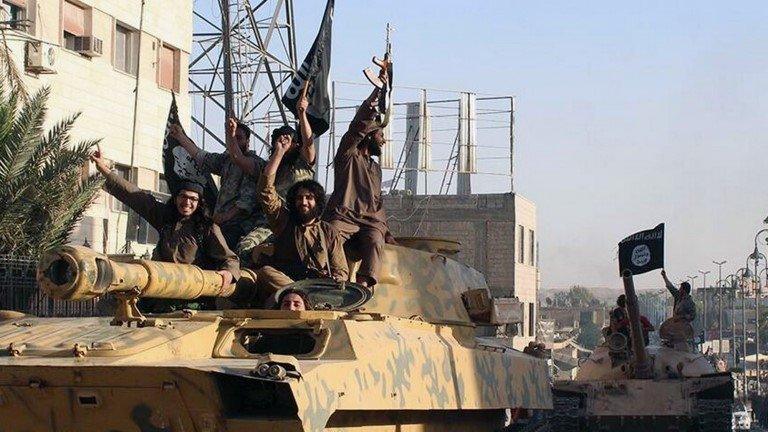British brothers jailed for training at Syria terror camp
- Published
Mobile footage shows part of the men's journey to Syria, as June Kelly reports
Two brothers have become the first Britons to be jailed for terrorism training in Syria.
Mohommod Nawaz, 30, and Hamza Nawaz, 24, both from Stratford, east London, were sentenced to four-and-a-half years and three years respectively.
They had admitted conspiracy to attend a terrorism training camp in 2013.
The judge said the men's "focus" was the regime in Syria rather than attacks in the UK and there was no evidence either man had taken part in fighting.
However, Judge Christopher Moss QC added: "It is clear from the evidence from mobile phones that you both had been in a camp in Syria used for terrorist training.
"The evidence shows you were there for jihad, or holy war, and wanted to join an extremist group."

The pair had photos of the training camp on mobile phones
Immigration and Security Minister James Brokenshire said the sentences sent a "clear message that people who commit, plan and support acts of terror abroad will face justice when they come back to the UK".
The minister also pointed to the Counter-Terrorism and Security Bill, external, currently before Parliament, which he said would usher in "tough new powers to disrupt travel to Syria or Iraq and control the return of suspected terrorists".
Mohommod Nawaz, previously convicted of kidnap, also pleaded guilty to unlawfully possessing ammunition.
Scotland Yard described the jailing of the two men as a "landmark case" - and the first of a string of cases due to come before the courts for sentencing.
Detective Chief Superintendent Terri Nicholson of the Metropolitan Police's Counter-Terrorism Command appealed to families to help them prevent others travelling to Syria.
'Here for jihad?'
Last August, members of the Nawaz family contacted the police to say the brothers had gone missing.
The pair had said they were going out for a meal in Walthamstow in East London - but instead they had left for France in Hamza Nawaz's car.
From there they flew from Lyon to Turkey and ultimately crossed the border to join a jihadist training camp.
They returned to the UK in September but were stopped by border officers who found:
Ammunition designed for use in AK-47 rifles
Mobile phone pictures of a training camp
Additional videos of their trip to the war zone.
In one video, the men are at a river crossing on the Syrian border where they planned to avoid detection by Turkish soldiers.
The pair are asked who they support, and they reply "Junud al-Shaam", the name of a group also known as Soldiers of Damascus.

In one photo, Mohommod Nawaz posed with an AK-47 while wearing camouflage gear
The men are asked: "Here for jihad?" and one of them replies: "Jihad, yeah".
When the men later reached a training camp - later identified by an RAF reconnaissance expert to be near Latakia - they took further pictures, including one of their timetable.
The photo shows that their day would begin at 4.30am with early prayers and Islamic lessons, followed by physical training from 6am until 8am.
The note, written in English, said that there would be "military training" twice a day - and there would be further Islamic lessons before bedtime, which was 10pm.
Other images of the camp showed a rifle by a bed and some kind of rudimentary training ground.
In one image, Mohommod Nawaz was seen wearing camouflage gear and holding what appears to be an AK-47 rifle with a magazine of ammunition.
'Everyone will be angry'
Detectives believe the pair largely kept their planned trip secret. Some members of the family said they believed the brothers had gone to Scotland for charity work.
But Hamza Nawaz sent a message by social media to his brother Hussain and selected friends, confirming his intentions.
"We've left to come to Syria," read the message sent via Whatsapp. "We know everyone will be angry with what we have done but its something we wanted to do. I will be in touch soon."

Border officers found bullets and mobile phones with incriminating material on them
The brothers had initially planned to stay for months and had searched online for information about joining mujahideen. Detectives believe the men had initially planned to graduate to a more onerous training camp, and it was not clear why they returned after just a few weeks.
Although they said nothing during police interviews, the pair later provided a defence statement saying that they had wanted to go to Syria to join a humanitarian aid operation.
The jailing of the two men is the first in a string of cases, with several men convicted of terrorism offences in relation to Syria waiting to receive sentences.
Det Chief Supt Terri Nicholson: "Families can spot changes in behaviour"
At least three other men face similar charges directly linked to activity in Syria. Others are awaiting sentencing for planning their own activity or assisting others.
Detective Chief Superintendent Terri Nicholson of the Metropolitan Police's Counter-Terrorism Command said: "It's a landmark case with many others in the pipeline for sentencing.
"We have two brothers from east London who have travelled to Syria and engaged in and received terrorist training while they were out there and then returned to the UK. This is a significant sentence for us."
She appealed to families to work with the police, saying the consequences for those that travel could be death on a battlefield.
'Utter devastation'
"It is very difficult to speak to the police about your own children," she said.
"In this particular case, they quite clearly travelled out to receive terrorist training and they have admitted that.
"But that is not always the case, so for the families - an absolute plea - we have many many mechanisms in place to support those families if they come forward early enough. We can help.
"We see at first hand the utter devastation that these young people going to Syria, causes to families."
The Old Bailey heard that Mohommod Nawaz was previously convicted in 2009 of blackmail, false imprisonment, kidnap and wounding.
He and others held the kidnap victim for 23 hours after snatching him outside his home.
They covered his head, stole his Rolex watch and cut and burnt him until he handed over his bank card pin number.
Nawaz and the others kept the man handcuffed and bound and threatened to cut off his fingers while they asked his family for £70,000.
He was subsequently jailed for six years - and his release on licence included a condition banning him from travelling outside the UK.
- Published26 November 2014

- Published18 November 2014
